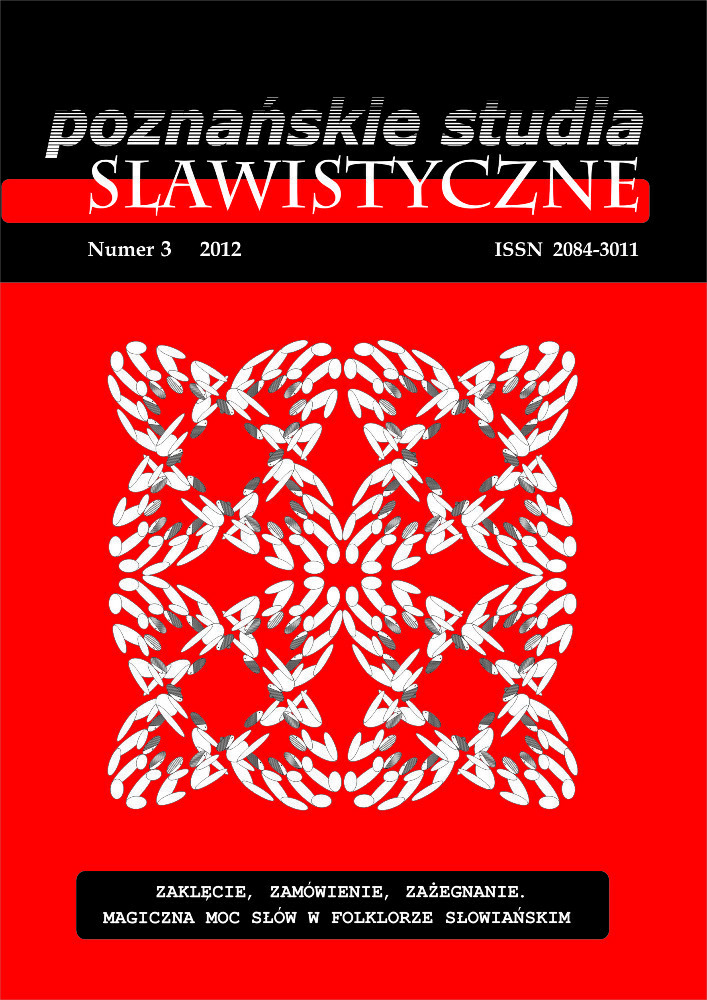Abstrakt
This paper offers an analysis of (prevalently feminine) curses which come to being within the text of the epic songs. This specific form of cursing is particularly pointed in the curses by mother’s milk. Both in tradition and in the epics, these curses are equal to taboo, which means that nobody dares disobey them: such is the deep belief in their efficiency. Because there is no discrimination in the epics about who can or cannot make a curse (everybody can: narrator/singer, protagonists, antagonists, heroes and their foes, messengers, mothers, wives, godmothers, sisters, brothers, fairies, forests, etc.), focusing on the parental and lovers’ curse is necessary for the sake of congruence. This will help in spotting the interactive patterns in the structure of epic songs more accurately. The analysis is done on the corpus of approximately 1500 epic songs described at the end of this paper.Bibliografia
Hrvatske narodne pjesme. Odio prvi. Junačke pjesme, ur. I. Broz, S. Bosanac, Zagreb 1890–1940.
Muslimanske narodne junačke pjesme, sakupio E. Hadžiomerspahić, Banja Luka 1909.
Narodne pjesme muslimana u Bosni i Hercegovini, sabrao K. Hörmann, knjiga I–II, Sarajevo 1933.
Narodne pjesme muslimana u Bosni i Hercegovini. Iz rukopisne ostavštine Koste Hörmanna, red. Đ. Buturović, Sarajevo 1966.
Nikolić D. , Struktura i funkcija kletvi u usmenoj i pisanoj epici, „Narodna umjetnost” br. 47/2, 2010.
Ајдачић Д. , Прилог проучавању клетви у усменој књижевности, u: idem, Прилози проучавању фолклора Балканских Словена, Београд 2004.
Банашевић Н. , Циклус Марка Краљевића и одјеци француско-талијанске витешке књижевности, Скопље 1935.
Детелић M., Митски простор и епика, Београд 1992.
Ерлангенски рукопис старих српскохрватских народних песама, издао Герхард Геземан, Сремски Карловци 1925.
Караџић В.С., Српске народне пјесме 1–9, Београд 1899–1902.
Пешикан-Љуштановић Љ. , Свете и проклете – жене из породице Бранковић у историји и усменој традицији, у: eadem, Станаја село запали. Огледи о усменој књижевности, Нови Сад 2007.
??????? ???? ???? ????????, ?????? ??????? ??????, ?????? ? ???????????? ????? ???? ??????????? ???????? 1864–1964 ? ??????????????? ?????? ?????? 1787–1987, ??????? 1986–1988, http://scc.digital. nb.rs/collection/epska-vuk-I [preuzeto: 3.10.2012].
Сарајлија С.М. , Пјеванија црногорска и херцеговачка, прир. Д. Аранитовић, Никшић 1990 [Пјеванија церногорска и херцеговачка, сабрана Чубром Чојковићем Церногорцем. Лајпциг 1837].
?????? ??????? ?????? ?? ???????????? ???????? ???? ????. ????????, ??????? 1974 http://scc.digital.nb.rs/collection/epska-sanu [preuzeto: 3.10.2012].
Licencja
Copyright
© 2012 Uniwersytet im. Adama Mickiewicza w Poznaniu
OPEN ACCESS
